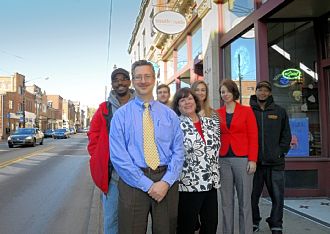
South Side Real Estate Board Says Mission Accomplished

From left, Ron Goings, Rick Belloli, Aaron Sukenik, Judy Dyda, Rachael Glasder, Susie Puskar and DaVar Cutler of the South Side Local Development Co. -- Lake Fong/Post-Gazette
South Side Local Development Co., one of the most successful nonprofit real estate developers in Pittsburgh, will spend the next 18 months putting itself out of business.
The board decided to dissolve the little company whose 28-year tenure on the South Side has coincided with the neighborhood’s transformation in private property values, popularity and market economy.
A successor organization with a focus on public issues will be formed with community feedback to the South Side Planning Forum, the neighborhood’s umbrella for other groups, and the Pittsburgh Partnership for Neighborhood Development.
“This is an exciting transition, and I’m thinking of this as a huge success story,” said Ellen Kight, executive director of the Pittsburgh Partnership for Neighborhood Development. “They have really done what a (community development corporation) is supposed to do.”
Successful development corporations step in with public investment to help neighborhoods attract private investment. Some also have youth and job training programs, public safety committees and other outreach. The South Side nonprofit has largely focused on real estate and has built or renovated more than 100 homes in the past 20 years.
Private developers have added some 800.
“We’ve done our job,” said Tracy Myers, the company’s board president.
In 1982, when the company was founded, property values were two-thirds of the city’s median value, said executive director Rick Belloli. In 2008-09, those values were 170 percent of the city’s median. About 50 percent of the retail space along East Carson Street was vacant in 1982, and that rate is now at about 10 percent, he said.
Rob Stephany, executive director of the Urban Redevelopment Authority, said there is still work to be done by a high-capacity real estate nonprofit in the South Side’s adjacent neighborhoods.
“The target area is big, and the next step would be moving that [real estate] strength to the next frontier,” including Allentown and Arlington, he said.
“Clearly from a real estate value standpoint, the [development company] has been an invaluable piece of the puzzle,” he said. “The equity senior citizens have in their homes is growing, and that’s a proud moment. The fact that there are $400,000 sales in the South Side astounds me to this day.”
The remaining challenges largely have to do with the proliferation of bars, said Ms. Myers. “That’s a consequence of our success.”
The East Carson corridor’s accumulation of liquor licenses is considered to be at saturation by most stakeholders. Uncivil and drunken behavior on weekend nights has some homeowners at the breaking point. Resident Thomas Kolano said he is “very concerned a lot of people are actually talking about leaving the neighborhood.”
“If there isn’t a push-back from residents, this could become an undesirable place to live,” he said. “Sunday through Wednesday and some Thursdays it functions as a normal neighborhood — beautiful and vibrant. I love it. But Friday and Saturday are crazy. It’s like Jekyll and Hyde.”
The city has cracked down on parking violations in recent weeks, and Councilman Bruce Kraus has held several meetings to promote a management strategy for Carson businesses.
Mr. Stephany said a neighborhood improvement district “is an essential next step. The only way to correct some of the issues there is to have collaborative problem solving.”
A neighborhood improvement district is like a business improvement district, except it includes interests beyond those of businesses, such as parks. Participants pay a fee to have the interests of their stated district managed and maintained. The Pittsburgh Downtown Partnership is one example of a business improvement district.
A management strategy for East Carson businesses was recommended several years ago by consultants from the International Downtown Association. A committee of the South Side Planning Forum is gathering feedback to determine the range of focus of the successor organization.
The Pittsburgh Partnership for Neighborhood Development paid for an employee to go door-to-door to gather that feedback. The staff of the local development company will not be involved in the successor agency, although some of its board may be.
Ms. Myers said that while winding down, the agency “still has properties and buildings we want to make sure are well cared for. Some entity needs to keep an eye on these things, to protect all the progress we’ve made to improve the physical environment” and ensure that developers follow historic guidelines.
“Some things we do will have to be done by someone else or not get done,” she said. “The community has to set its priorities.”
